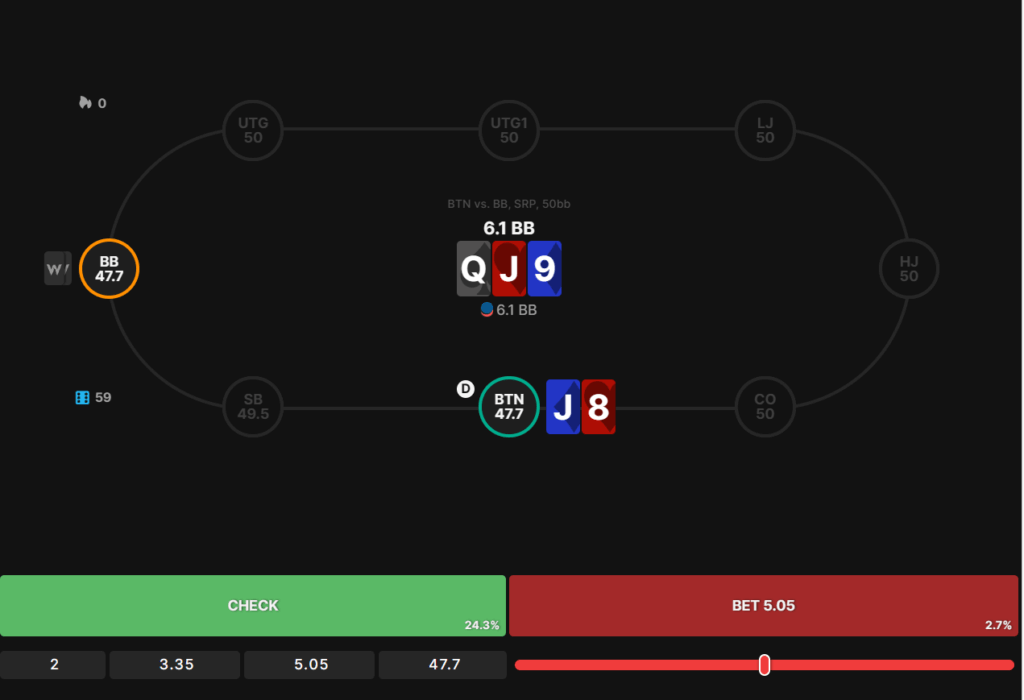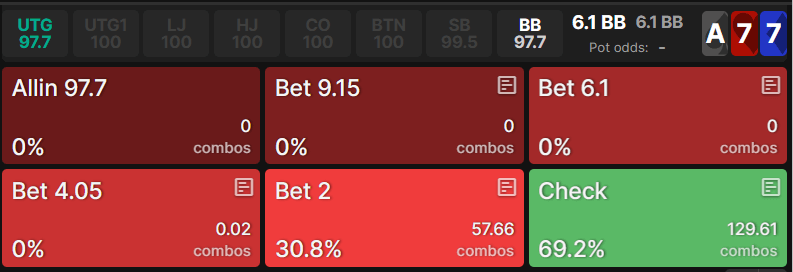Poker Solvers have changed the landscape significantly. Poker Coach John “WhatA298” Bradley explains in our latest poker strategy article how they work.
Many players have improved massively with the use of solvers; however, many have found them to be an ineffective study tool that has hurt their game.
In this article, you will learn the best ways to use solvers to your advantage, and the pitfalls which you must avoid.
What does a Poker Solver do?
A Poker Solver is a computer program which, through complex algorithms, determines ‘optimal play’ given two players who are clairvoyant of each other’s strategies.
One way to think of this is to consider the game rock-paper-scissors.
If there was a solver for rock-pair-scissors; it would conclude that the ‘optimal play’ was to choose rock 33% of the time, paper 33% of the time and scissors 33% of the time.
This does not mean that it is telling you how is best to play exactly.
If you are playing rock-paper-scissors against an opponent who always chooses rock, then the best approach is to choose paper 100% of the time.
Following the solver in this instance would be illogical.
Useful ways to use a Poker Solver
Despite the drawbacks of a solver, it has many incredibly powerful functions to help you grow your poker skills:
Poker Solvers Training
Most Poker Solvers on the market today have a training function. You can select a situation; for example, Multi-Table Tournament, Button vs Big Blind, 50 blinds deep in a single raised pot.
You can then play versus the solver, in this spot, repeatedly.

The program will then give you real time information on where you are deviating from the ‘solution.’
This can be very valuable to determine whether this is a deviation that is warranted, due to the deviations that your opponent is making, or whether you may be making a mistake yourself.
Node Locking
Many Poker Solvers also allow you to adjust the ranges within the calculation.
If you let the software, find the optimal solution without this then it will determine the optimal range preflop, for example.
However, your real-life opponents are very unlikely to play this exact range.
Node locking allows you to include the information you have on your opponents, run the program and then it will give you the optimal response.
As an example, let us assume that you know that your opponent folds the Big Blind way too often when you raise the Small Blind. Perhaps he folds 70% of the time.
The solver output for this spot, with no node locking, may show that you should raise 50% of the time and the Big Blind should call or raise 50% of the time.
You have additional information (that your opponent folds 70%) and so you input that into the calculation.
With that new information, the solver will now suggest you raise 100% of your hands.
This becomes actionable advice which will make you real money at the poker tables.
Learning the Mechanics of Poker
Solvers can also teach you how the game works fundamentally.
You can look at a solver output of a spot. For example, when you raise from either UTG or the Button, the Big Blind calls and you are checked to on a A77 rainbow flop.
When you are UTG, the solver suggests betting around 30% of the time:

But when you are the Button, on the same board, the solver suggests betting around 70% of the time:

When UTG, you have a stronger range than when you are on the Button. When the Big Blind defends versus the Button, they have more 7x than when they defend versus UTG.
So why do you bet more often when you are the Button?
Questions like this help you understand which factors are the most important in a poker hand, fundamentally.
In this example, I believe that you bet more often on the Button, due to having a large enough amount of 7x in your range.
When you are UTG, the Big Blind has significantly more 7x in their range compared to you and thus has a reasonable nut advantage.
When you are on the Button, both players have around the same amount of 7x.
You could glean from this investigation, that nut advantage is perhaps a more important factor than equity advantage or positional advantage, when betting and building a pot in No-Limit Hold’Em.
Pitfalls
As previously stated, studying solvers can certainly fast track your poker growth, but there are certainly some common pitfalls and traps that players will often fall into.
You are not getting an exact answer
A solver is essentially a very sophisticated computational program. It is like a calculator.
It is not telling you exactly what you should do when you next sit down to play poker.
The solver helps you to find the answers yourself, but it’s solutions are not the answers in and of themselves.
Players will commonly try to copy the solver outputs and switch off their problem-solving, critical thinking mind.
This is very detrimental to your game and your progression as a poker player.
Do not get lost down the rabbit hole
So much information can be gleaned from a solver, that it is possible to lose track of time, and of your original purpose for studying.
It is so easy to become hyper focused on minute details in the outputs. It’s very important to stop and think regularly, whether what you are studying is useful and applicable to your game.
Many players will waste countless hours through fruitless studying that is, at best, doing nothing to further their progression.
Sometimes things are just simple
Studying solvers can lead to thinking in such incredibly complicated ways that you miss the obvious information that is right in front of you.
You may be deciding whether to bluff the river at a live game based on how many combos you need so that your range is balanced, for example.
In reality, your opponent may be drunk and has not folded a river all evening.
The simple truth is that, if a player never folds the river, then you should never bluff.
It is that simple. It does not matter if your range is balanced or not.
A large amount of solver study, can sometimes lead players to become blinded to the obvious, such as this.
Poker Solvers Conclusion
Poker Solvers are a powerful tool to help you grow as a poker player.
Use the ways described in this article to fast track your growth, and be careful not to fall into any of the common traps.
If you put in the time and effort efficiently, then your time will have been well spent, and success is inevitable.
Good luck on your poker journey and if you have any questions, please do not hesitate to ask them in the poker coaching section of the VIP-Grinders Discord Channel.
Terms and conditions apply. New customer offer and 18+ only. Please gamble responsibly! Should you require help regarding your betting pattern, visit www.begambleaware.org




















